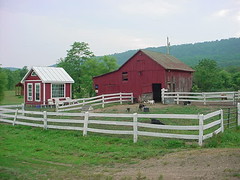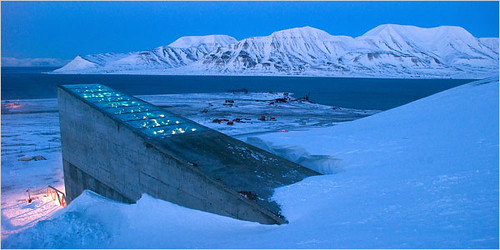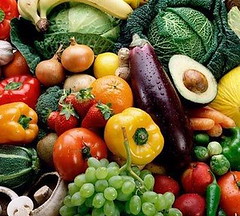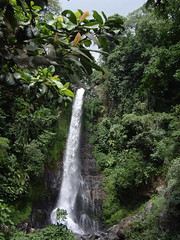Time to Buy the Farm
__________________________
Many things economic are pointing to farmland - and the food a farm can produce - as being the investment idea whose time is here, in fact, whose time came quite awhile ago. But it's not too late. If you have the means, can find a decent plot of farmable land and have the incentive to raise and grow your own food, my suggestion is, 'go for it.' By any reasonable estimate, it will be an investment - and a lifestyle change - you won't regret.
________________
__________________
The last time 'urban farming' became popular in the USA was in the 1970s following the Arab oil embargo, and coincided with high inflation and recession. Sound like deja vu? Back then, 'victory gardens' were the rage and this college student worked his way to his economic degree in part by roto-tilling many a garden plot with a Troy-bilt tiller out of Troy, New York. Even community gardens were a common endeavor at that time.
In developing nations, like China, the population is moving from the country to the city to participate in globalization. Methinks those in developed nations should do the opposite and locate a piece of farmland and move out of the urban areas. If those developing nation's farmers are moving to the city, who is going to grow the food for them and for the rest of us in the developed nations? Indian farmers are committing suicide at alarming rates, as they are unable to compete with imported food stuffs.
Indian Farmer Suicide Toll Rises
The Suicide Economy Of
Corporate GlobalisationThe Indian peasantry, the largest body of surviving small farmers in the world, today faces a crisis of extinction.
Two thirds of India makes its living from the land. The earth is the most generous employer in this country of a billion, that has farmed this land for more than 5000 years.
.....in 1998, the World Bank's structural adjustment policies forced India to open up its seed sector to global corporations like Cargill, Monsanto, and Syngenta. The global corporations changed the input economy overnight. Farm saved seeds were replaced by corporate seeds which needed fertilizers and pesticides and could not be saved......the farmers are seeking an end to the free market regime introduced last year following the World Trade Organisation agreement.
The same diabolical market manipulators that brought us the Housing Debt Bubble and the Financial Derivatives Debt Debacle are now bringing the rest of us the Genetically Engineered Foods Debt Debacle. As seed saving is prevented by patents as well as by the engineering of seeds with non-renewable traits, seed has to be bought for every planting season by poor peasants. A free resource available on farms became a commodity which farmers were forced to buy every year. This increases poverty and leads to indebtedness.
As debts increase and become unpayable, farmers are compelled to sell kidneys or even commit suicide. More than 25,000 peasants in India have taken their lives since 1997 when the practice of seed saving was transformed under globalisation pressures and multinational seed corporations started to take control of the seed supply. Seed saving gives farmers life. Seed monopolies rob farmers of life.
Suicide Economy Of
Corporate Globalisation
Indian farmers are committing suicide and Haitians, thanks to IMF and World Bank policies of the 1980s, are eating mud cakes.
Mud Cakes Become Staple Diet The woes were compounded by a decision in the 1980s to lift tariffs, when international prices were lower, and flood the country with cheap imported [GMO] rice and [GMO] vegetables. Consumers gained and the IMF applauded but domestic farmers went bankrupt and the Artibonite valley, the country's breadbasket, atrophied.
The New Giants are fighting back:MARATHON talks for a new global trade deal collapsed last night after a clash over agriculture between the United States, the world's biggest economy, and emerging heavyweights.
The breakdown came on the ninth day as the US and India failed to find a compromise on measures intended to help poor countries protect their farmers against import surges, a diplomat said.
World Trade Talks Fail
Ah, the effects of globalization the Jewish controlled media doesn't report on. Could eating 'mud cakes' be our fate in the not-too-distant future?
Meanwhile, the global elite protect themselves from the effects of the GMO food they push on us peons:
Near Arctic, Seed Vault Is a Fort Knox of Food
__________________
Artic Seed Fault for God's Seeds, while Cargill, Monsanto, Syngenta and others, ruin the seed base through GMO.
____________
Don't think for a nanosecond that these GMO giants, or the likes of Bill Gates and the Rockefellers, who have invested millions in the Food Bank, [Doomsday Seed Vault,] are going to share the stored unmolested seeds with us when the time comes, and the time will come. If they were storing these seeds in the interests of all mankind, why are they building the seed fault in the Arctic, where it is virtually impossible for any of us to get to? And unlike the shiny gold in Fort Knox, the 'edible gold' stored in this vault is actually there. Fort Knox Gold Story
Countries Are Renting Farmland Abroad
As food crisis worsens, some nations are desperate for arable landGlobally, farmland is disappearing at an alarming rate. According to estimates, approximately 50 million acres vanish each year to urbanization, population growth, and economic and industrial development. In Iraq, where the Tigris and Euphrates rivers have nourished riverbanks since the start of civilization, farmland is expected to shrink 30 percent because of upriver damming in Turkey. Vietnam lost 1.2 million acres of farmland from 2001 to 2007; 123 golf courses, among other developments, have gone up since.
Renting Farmland
individual farmers from the United States and Australia have started looking in larger numbers to overseas farmland, particularly in South America. "We have certainly seen an increase [here]," says Andy Duff, a Rabobank International analyst based in Brazil. "There are the investors who see land as the root of all commodities and believe land may be an interesting investment, and we have also seen bona fide farmers who are looking to expand their operations from other parts of the world."
As the above article points out, productive farmland is becoming scarce worldwide. Laying claim to your 'back forty' might just be the best investment you've ever made.
Along with being an excellent investment, the organic food that can be grown under your control on your land, is an additional benefit, a benefit that may just turn out to be vitally more important - and rewarding - than owning the land itself.
_______________
_____________




















0 comments:
Post a Comment